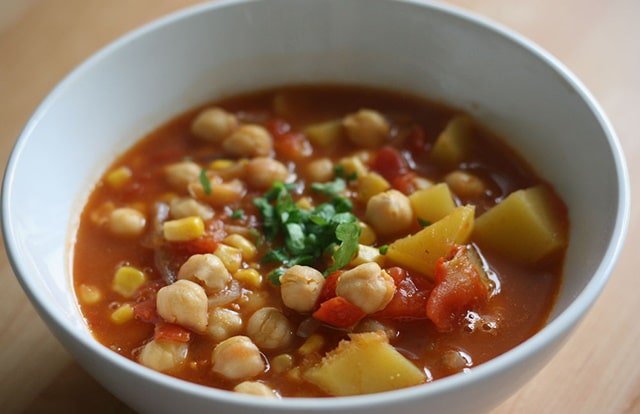7 Ways to Avoid Overeating This Winter
The urge to eat more when the weather gets cold is ingrained in our DNA. Avoid bulking up with these tips for tricking Mother Nature. – By Selene Yeager

When it comes to avoiding overeating in the wintertime, the struggle is real. Science even says so. Researchers from the University of Exeter used computer models to predict how much fat animals should store during various times of food availability and abundance. Not surprisingly, the model predicted that, given the opportunity, all animals (including us) would overeat to store fat during times when food is generally scarce. So yes, those office pantry cupcakes and cookies? Nearly irresistible to your primitive brain.
What’s a wannabe-lean cyclist to do today, when food availability isn’t an issue but the urge to overeat is? The trick is getting your brain to think it’s getting what it wants and everything is going to be okay, says Leslie Bonci, MPH, RD, CSSD, RDN, co-author of Bike Your Butt Off with me. Here’s how.
Make soup. Your body is craving comfort foods and a feeling of fullness. Soups, stews, and chilis all fit the bill and can be made with ingredients that won’t pack on pounds, says Bonci. “Hot, liquidy foods like soups take longer to eat than other foods and also make you feel fuller so you’ll be satisfied with an appropriate amount of food.”
Roast your veggies. Fresh crisp salads sort of lose their appeal when it’s freezing cold outside and pouring with rain. But that doesn’t mean you stop feeling satisfied by healthful, filling, and non-pound packing veggies. Just roast ‘em! When you roast vegetables, their flavour becomes concentrated and their natural sugars caramelsze, so they are scrumptiously, richly satisfying.
Draw out your meals. Instead of fighting the urge to eat, prolong your eating experience, says Bonci. She recommends splitting one meal up into smaller portions so that you’re eating more frequently, not necessarily eating more. You won’t eat any more total calories overall, but by spreading them out, your urge to keep eating will be satisfied.
Get into “the zone.” The Zone Diet was all the rage in the mid-’90s because it dared a fat-phobic nation to eat more healthy fat and high-protein foods while limiting sugars and starchy carbs. This style of eating was ahead of its time and really good advice for avoiding weight gain in the winter. “Protein and fat take your body longer to digest, and promote satiety, so you’re less likely to overeat,” says Bonci. Aim for about 30-percent protein, 30-percent fat, and 40-percent carbohydrates in the form of veggies, legumes, and whole grains. Try adding avocado, beans, and toasted nuts to your meals for satisfying protein and fat as well as healthful, filling fibre.
Spice it up. Warm spices like red pepper, cinnamon and clove, as well as garlic and ginger, can make your meals more satisfying and give your metabolism a bit of a bump—both of which help fend off overeating and winter flab.
Be a light seeker. The lack of sunlight during the shorter days of winter can trigger a drop in the feel-good brain chemical serotonin, which in turn can lead to carb binges as you try to give your brain a chemical boost. Spend time near windows and ride outdoors during winter months to maximise your light exposure. “Brighten up your kitchen and dining area with plenty of lights so you’re not cooking and eating in a dreary and/or dark environment,” says Bonci.
Keep moving! Yes, you may feel like curling up on the couch with a bag of chips, but you’ll actually feel much better if you get exercise. Exercise not only burns fat and calories (which obviously helps keep winter weight gain in check), but it’s also a natural serotonin booster and mood lifter, so the urge to overeat won’t be as strong.

